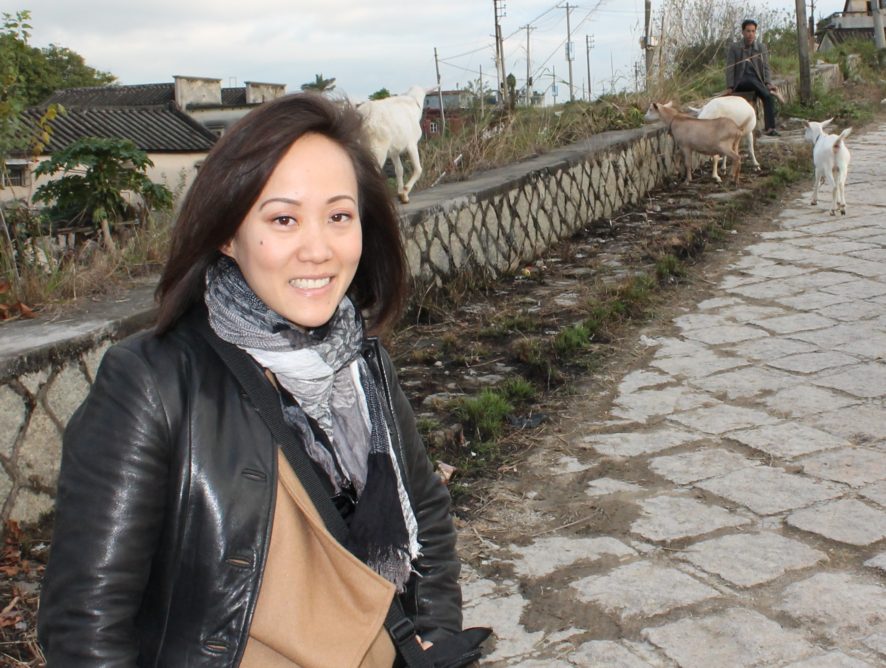Nellie Chu holds a PhD from the University of California, Santa Cruz (2014). As a cultural anthropologist she engaged in postdoctoral research at the transregional research network CETREN (2014-2016) and was affiliated at CeMEAS.
Where did you study? What did you study? In which field are you working in? etc.
I received my Ph.D. degree in Cultural Anthropology from the University of California, Santa Cruz. Prior to my doctorate, I earned a B.A. in International Relations at the University of California, Davis, where I developed my love for the anthropology of China. As a young student, I was compelled by the classic ethnographies written by Margery Wolf. Her cultural analysis of “the uterine family” was particularly inspirational for me. Wolf’s deep engagement with Chinese women and their kin-based relationships led me to pursue anthropology as a life-long endeavor. After I took my first anthropology of China class, I quickly immersed myself with historical writings on Maoist China, which included oral histories and memoirs of people who experienced the Great Leap Forward and the Cultural Revolution.
To this day, I enjoy reading scholarly works that address China’s past in the contemporary post-socialist period. I look forward to contributing to this fascinating field of study.
What are your main research interests?
Primarily trained in the anthropology of post-socialist China and the ethnography of global supply chains, I specialize in the intersecting topics of transnational capitalism, migration (transnational and domestic), counterfeit culture, gendered labor, industrialization, and urbanization.
What are your current projects?
My current book manuscript, The Anticipatory Present: Breaking Out of the Speculative Cycles of Transnational Migrant Entrepreneurship in Southern China, examines how Chinese, African, and South Korean migrant entrepreneurs in Guangzhou, China synchronize their life trajectories and changing subjectivities of labor with the boom and bust cycles that link the global commodity chains of fast fashion. Taking the tempos of market volatility as its objects of ethnographic analyses, my project provides an ethnographic case study of the heterogeneous and uneven rhythms that comprise the speculative dynamics of supply chain capitalism.
What led you to pursue this research?
My research, which I began in 2010, was driven by the question of why the “Made in China” tag is often associated with low-quality and counterfeit (shanzai) goods. I was also curious about what the notions of “cheapness” or “counterfeit” meant for the producers and workers that manufacture them, and what this label tells us about China’s post-socialist society as well as the changing global economy. Specifically, I asked: What kinds of cross-cultural relations are enabled by the production and exchange of fast fashion? In what ways do they construct and challenge notions of cultural authenticity? Analytically, I was interested in studying the intersections between China’s post-socialist transformations and the formation of global commodity chains across the Pacific Rim as well as across the developing world or the Global South.
How is your research unique?
When we, as consumers, think of fashion and the “Made in China” label, we often conjure up the aura of luxury brands with their glitz and glamor on the one hand, and images and stories of exploited factory (female) laborers on the other. Indeed, these stories and images on either ends of the spectrum are important in understanding the links between production and consumption of fashion commodities. However, my ethnographic focus on the intermediary, or middle, links of the supply chains for fast fashion in Guangzhou reveals far richer and more complicated stories of people’s lives among those who engage in these supply chains. They reveal the dilemmas and contradictory conditions in which they find themselves. They also uncover the unstable social relations and uncertain conditions of livelihood upon which transnational capitalism depends.
How would you describe your work’s importance to an interested lay audience?
Since April 2013 when the Rama Plaza building collapsed in Dhaka, Bangladesh, the exploitative conditions of the global fast fashion industry have caught the attention of scholars, journalists, industry participants, and consumers worldwide. While analysts emphasize multinational corporations’ need to standardize quality control and labor practices in the name of social responsibility and sustainable development, household workshops and other informal industrial sites, much like the factories of Rama Plaza, across China and other places in the Global South continue to facilitate most of the world’s garment manufacture largely outside the purview of government and corporate regulation. Indeed, many of these poorly constructed, informal “satellite workshops,” which manage the outsourced labor and manufacturing capabilities of larger, more centralized factories, continue to fuel the extension of domestic and transnational supply chains that stretch across the developing world.
My work aims to demystify the globally-recognized “Made in China” label and show how the proliferation of small-scale and informal garment workshops and wholesale sites link China with other countries across the Global South. The devaluation of human lives and their labor across the developing world calls for finely tuned historical and ethnographic analyses of the spatial and temporal intersections between China’s post-socialist transformations and the emergence of transnational subcontracting.

